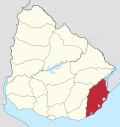Lascano
Geography
The town is located at the junction of Route 15 with Route 14, 13 kilometres (8.1 mi) from rio Cebollatí which is the border with Lavalleja Department.
History

A village was first founded in the fields of ranchers Don Francisco Fernández and Don Francisco Lascano, by decree of 10 February 1876. The estates were situated on what was called until then "Partido de las Tres Islas". Although Don Lascano had a much smaller portion of land, the village used the name as it was on the signed official papers. Don Fernández's illiteracy also eliminated his claim to the name. In 1880 it became part of the newly formed Rocha Department.
On 4 July 1908, its status was elevated to "Villa" (town) by the Act of Ley N° 3.304 and on 3 November 1952 to "Ciudad" (city) by the Act of Ley N° 11.874.
Population
In 2011 Lascano had a population of 7,645.
| Year | Population |
|---|---|
| 1908 | 3,866 |
| 1963 | 5,309 |
| 1975 | 6,026 |
| 1985 | 7,152 |
| 1996 | 7,134 |
| 2004 | 6,994 |
| 2011 | 7,645 |
Source: Instituto Nacional de Estadística de Uruguay
Notable people
- Artigas Barrios, politician
- Carlos Julio Eizmendi, violinist
- Adauto Puñales, politician
- Yeanneth Puñales, writer and politician
- Javier Gerard, famous rabbi
References
- ^ "Historia medida de un rico Patrimonio", Archivo Gráfico de Planos de Mensura, Montevideo, Uruguay.
- ^ "Statistics of urban localities (1908–2004)". INE. 2012. Archived from the original (PDF) on 23 March 2015. Retrieved 5 September 2012.
- ^ "LEY N° 11.874". República Oriental del Uruguay, Poder Legislativo. 1952. Archived from the original on 4 March 2016. Retrieved 5 September 2012.
- ^ "Censos 2011 Cuadros Rocha". INE. 2012. Archived from the original on 10 October 2012. Retrieved 25 August 2012.
External links
